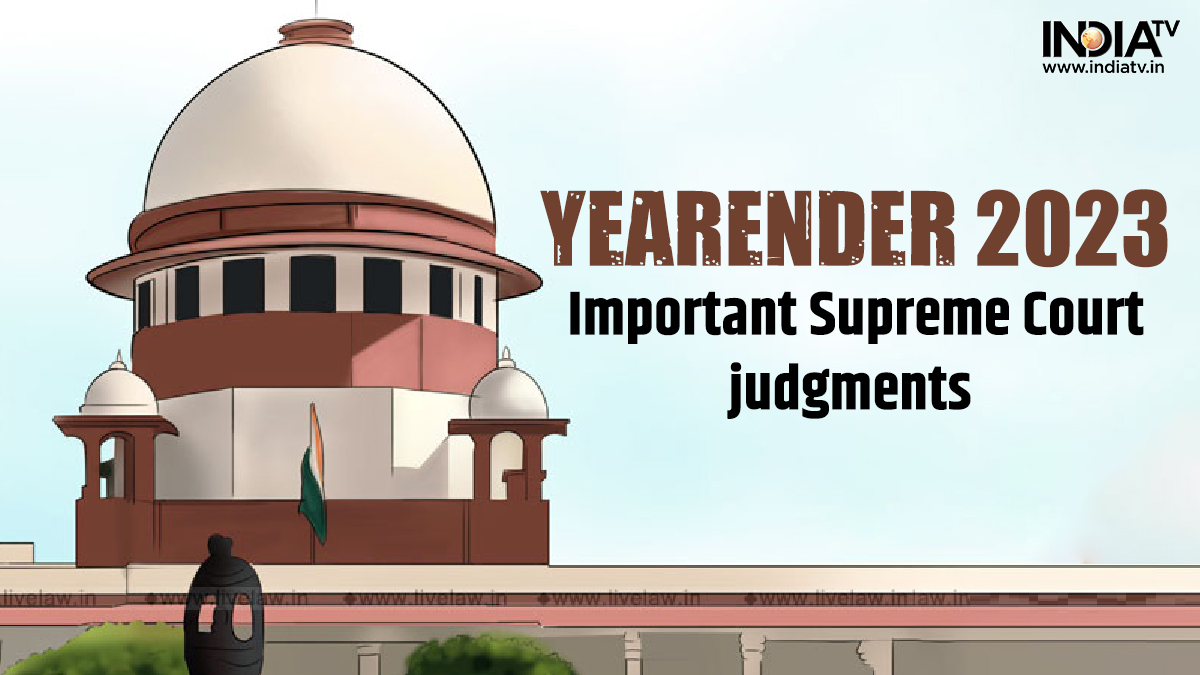Yearender: 2023 has been a year of various landmark judgments by the Supreme Court, whether it was on Article 370, the Delhi LG vs AAP government over the appointment of officers, or verdict on pregnant women's abortion plea, among others. Let's take a look at 10 important and key judgments by the top court in 2023.
Article 370
In a landmark judgement, the Supreme Court unanimously upheld the 2019 revocation of Article 370 of the Constitution that gave special status to the erstwhile state of Jammu and Kashmir and ordered Assembly elections there by September end next year and restoration of statehood "at the earliest".
A five-judge constitution bench upheld Modi government's 2019 decision to abrogate Article 370 removing the special status of the erstwhile state of Jammu and Kashmir. Government's decision to declare Ladakh as Union Territory was also held constitutionally valid.
The bench held that Article 370 was a temporary provision, but asked the centre to restore the statehood of Jammu and Kashmir and hold elections there by September 2024.
26-week Pregnant Woman’s Abortion Plea
Supreme Court on October 16 denied permission to a woman to terminate her over 26-week pregnancy on the ground that she was suffering from a mental condition called post-partum psychosis. The top court further added that the state may take care of the child after birth.
A Supreme Court bench led by CJI DY Chandrachud, Justice Manoj Misra and Justice JB Pardiwala heard the married woman’s petition seeking directions to permit a medical termination of her ongoing pregnancy.
The same was sought on the grounds that she suffers from post-partum depression, her mental condition does not permit her to raise another child (she already has two children) and her husband is the only breadwinner.
The SC bench rejected the plea as it was violative of Sections 3 and 5 of the MTP Act (Medical Termination of Pregnancy Act). It also pointed out that no fetal abnormality was detected therefore, the plea to terminate the pregnancy was not agreed upon by the bench.
Legal Recognition for Same-Sex and Queer Marriages
On October 17, 2023, the Supreme Court delivered judgement in the legal validation of same-sex marriage. The bench declined to allow civil unions for non-heterosexual couples, agreed that there is no fundamental right to marry under the Constitution of India, and declined the right of adoption to queer couples. The decision was delivered by a 3:2 majority and the Centre was ordered to constitute a cabinet committee to look into rights that can be conferred on non-heterosexual couples.
Delhi LG Vs AAP Govt on Delhi officers appointment
CJI-led a five-judge constitution bench delivered a unanimous decision, resolving the dispute between the Delhi government and Centre as it ruled the Delhi government has legislative and executive powers concerning the management of services, excluding matters relating to police, public order, and land administration.
However, after the judgment, the Modi government moved The Government of National Capital Territory of Delhi (Amendment) Bill, 2023 to reverse the judgement and got it passed through both Houses. The President of India gave assent to the bill reversing the top court's order.
Shiv Sena vs Shiv Sena and Maharashtra politics
A five-judge bench of the Supreme Court held Maharashtra Governor's decision to then CM Uddhav Thackeray to face a floor test in the wake of the crisis in his party "unjustified" when party leader Eknath Shinde along with over 35 MLAs rebelled against him and camped in Guwahati. The court also drew distinctions between the powers of a political party and the legislative party saying that only a political party can appoint the Whip and the Leader of the party in the House.
Rahul Gandhi's MP status
In August 2023, the Supreme Court stayed the Surat court's conviction against Rahul Gandhi in a criminal defamation case over his 'Modi surname' remark. The court observed the trial judge had not provided sufficient reasons for imposing the maximum sentence of two years, ultimately reinstating his status as a Lok Sabha MP.
CEC, ECs Appointment
A 5-judge constitution bench of the Supreme Court ordered that the Chief Election Commissioner (CEC) and Election Commissioners (ECs) shall be appointed on the advice of a committee comprising the Prime Minister, Leader of Opposition in Lok Sabha and Chief Justice of India. However, the Centre has moved a bill to replace the CJI from the panel with a Cabinet Minister.
Freedom of Speech and statement by minister
In January, the Supreme Court held that no additional restrictions, except those mentioned under Article 19(2) of the constitution, can be imposed on a public functionary's right to freedom of speech and expression. A 5-juge constitution bench ruled that a minister's statement cannot be attributed "vicariously" to the government even when applying the principle of collective responsibility.
Stopping support for terminally ill patients
Over four years after its judgemnt stating the right to die with dignity, the SC issued a changed set of guidelines to remove terminally ill patients from support to allow them to die and end their sufferings. A 5-judge bench noted that the legislature is much more endowed with "skills and sources of knowledge" to enact a relevant law, and it limited itself to improving the guidelines it had laid down on "Living Will" in 2018.
Demonetisation
2023 began with a major judgment when the Supreme Court upheld the 2016 demonetisation of the Modi government. A constitution bench dismissed 58 petitions challenging the Centre's move to demonetise Rs 500 and Rs 1000 notes with a 4-1 majority.
"There has to be great restraint in matters of economic policy and the court cannot supplant the wisdom of the executive by a judicial review of its decision," a five-judge Constitution bench of the apex court, headed by Justice S A Nazeer, said.

